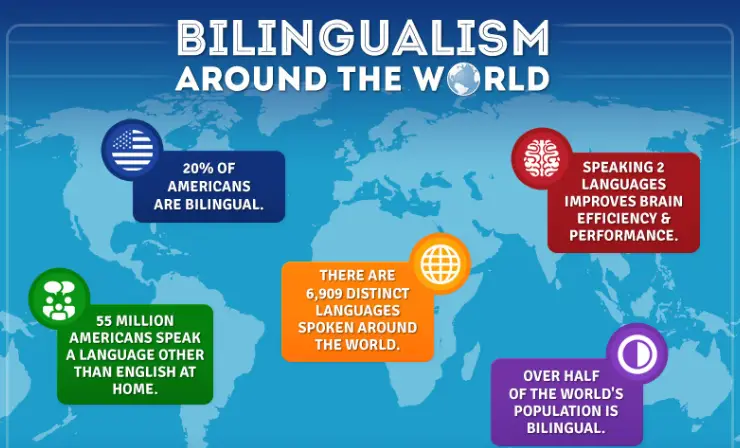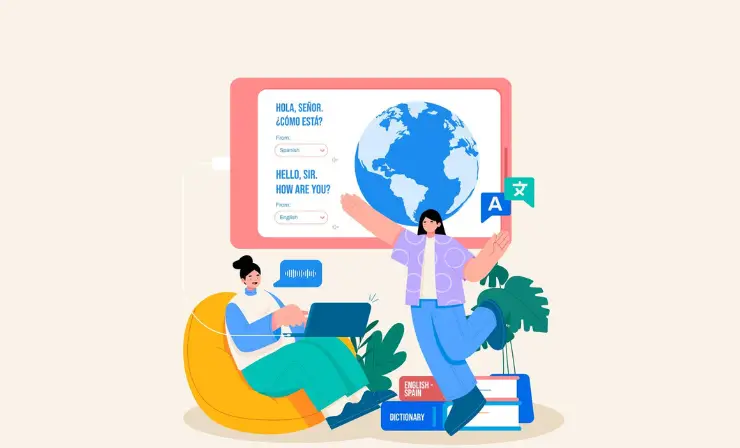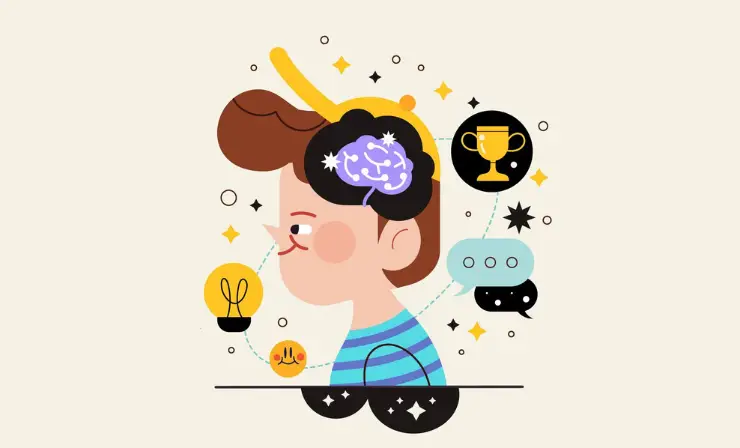In an increasingly interconnected and globalized world, understanding why students should learn a second language becomes crucial. This ability has transcended from being a simple asset to almost a necessity. For students at the crossroads of educational paths and future careers, mastering a second language unveils myriad opportunities, both personally and professionally.

Beyond the apparent benefit of enhanced communication abilities, bilingualism or multilingualism enriches learners’ cognitive capabilities, cultural understanding, and global awareness. It equips them with the tools not only to succeed in the global marketplace but also to navigate the complex tapestry of global cultures with empathy and insight.
The argument for incorporating second language learning into students’ curricula is compelling and multifaceted. Research consistently highlights the cognitive benefits, including improved problem-solving skills, enhanced memory, and increased attention span. Moreover, in the cultural dimension, it fosters a deeper understanding of and respect for diversity, preparing students to become global citizens. Professionally, bilingualism offers a competitive edge in the job market, where employers increasingly value the ability to communicate across cultural and linguistic barriers.
Really it depends from your needs and circumstances. In my professional experience, motivation is the only reason students will successfully learn a second language, either is business related, or a new boyfriend or an imminent trip.
Some might say that the best language to…
— ARTΞME (@StellaAmato4) January 17, 2024
As we delve into the benefits of acquiring a second language for students, we explore not only the practical advantages but also the profound impact it can have on their personal development and worldview. Learning a second language is more than an academic endeavor; it is a journey into understanding others and oneself, a bridge to the world, and a tool for shaping the future.
On this page, you will discover:
- Why Students Should Embrace Multilingualism →
- 7 Benefits Of Learning A Second Language →
- Best Languages to Learn After English →
- 15 Tips to Learn a Foreign Language →
Why Students Should Learn a Second Language — Embracing Multilingualism
Did you know that bilingual or multilingual individuals are often considered the brainiest bunch? Speaking more than one language opens up a world of cognitive advantages that go beyond just mastering new words. Imagine navigating through different cultural contexts with ease, your mind open to diverse perspectives and ideas. This adaptability not only enhances problem-solving skills but also fosters a sense of curiosity and open-mindedness.
Explore the transformative power of multilingualism and its impact by watching this enlightening video.
But here’s the real kicker: being bilingual isn’t just about speaking two languages. It’s like giving your brain a daily workout session! Processing two languages simultaneously keeps the mind sharp and agile, like a well-oiled machine. Studies have shown that bilingual individuals exhibit superior mental flexibility, longer attention spans, and sharper problem-solving abilities compared to their monolingual counterparts.
Bilingualism has even been hailed as a superhero in the fight against cognitive decline. Research suggests that the mental gymnastics involved in learning and using multiple languages can help stave off age-related diseases like Alzheimer’s and dementia. So not only are bilingual individuals smart now, but they’re also setting themselves up for a brighter, more vibrant future.

But perhaps the most magical aspect of bilingualism is its ability to shape the way we perceive the world. Languages aren’t just tools for communication; they’re windows into different cultures, histories, and ways of thinking. From unlocking ancient mysteries to connecting with people from all walks of life, bilingualism opens doors to endless possibilities.
7 Benefits Of Learning A Second Language
For students, learning a foreign language holds immense benefits, contributing to their academic success, personal growth, and future career prospects.

1. Increase in Self-Confidence and Happiness
The journey of mastering a new language is a profound booster of self-confidence and overall happiness for students. This process not only involves acquiring new vocabulary and grammar but also overcoming challenges and stepping out of one’s comfort zone. The sense of achievement that comes from being able to communicate in a foreign language is immense.

Research from the University of Cambridge highlights how language learning enhances self-efficacy, leading to a more positive life outlook. Similarly, findings by the Institute for Employment Studies demonstrate notable improvements in well-being, particularly in self-confidence and happiness. This uplift in self-esteem is crucial; it transcends linguistic accomplishments, empowering students to tackle broader academic and personal challenges with increased confidence and resilience.
In an insightful talk, Ellen highlights the unifying power of language and urges everyone to embrace learning a new language as a way to expand their horizons—watch her inspiring video.
Moreover, the positive feedback loop created by increased self-confidence and happiness encourages continued language learning and engagement with other cultures. It can spark a lifelong passion for exploration, both intellectually and geographically, leading to more fulfilling personal and professional lives. In this way, the benefits of language learning extend far beyond the classroom, impacting students’ well-being, social connections, and outlook on life in profound and lasting ways.
Explore the importance of mental health in education through “8 Reasons Why Students Should Have Mental Health Days: A Research-Based Analysis.” This detailed article provides research-backed insights into the necessity of mental health days for students’ well-being and academic achievement, advocating for their inclusion in educational policies.
2. Enhanced Decision-Making Skills
The transformative process of enhancing decision-making skills through second language learning reshapes how students evaluate information and make choices, illustrating why students should learn a second language. The University of Chicago’s research underscores the significant shift in cognitive processing when thinking in a foreign language, leading to more logical and less emotionally biased decisions.

This cognitive distance allows for clearer judgment and more rational evaluation of scenarios, which is particularly advantageous in complex and high-stakes academic settings. As students navigate their educational paths, they often face decisions that require weighing different options and outcomes. The ability to detach from immediate emotional responses and analyze situations with objectivity becomes a powerful tool in their arsenal.
Discover how the over 7,000 languages worldwide might shape our perception of the world through the lens of the Whorfian hypothesis, which suggests our language influences our thoughts, visions, and understanding of our surroundings—explore this fascinating concept by watching the video.
Moreover, this skill transcends academic environments and prepares students for real-world challenges. In personal and professional spheres, the clarity and rationality honed through bilingual decision-making processes contribute to sound financial planning, strategic career moves, and effective conflict resolution. The practice of thinking in a second language cultivates a mindset that values careful consideration and foresight, attributes that are invaluable in a rapidly changing world.
As students become more adept at making decisions in a second language, they also develop a greater awareness of cultural nuances and perspectives, further enriching their decision-making capabilities. This comprehensive enhancement of cognitive and cultural competence equips students with a robust framework for navigating life’s myriad choices with confidence and wisdom.
3. Strengthened Brain Power and Attention Span
Bilingualism acts as a rigorous workout for the brain, significantly enhancing cognitive abilities and attentional control. Engaging with multiple languages fosters neural plasticity, strengthening the brain’s networks and improving its agility. This cognitive reinforcement is manifest in enhanced memorization skills and a more robust working memory, foundational elements for academic excellence.

Students who are bilingual demonstrate an ability to retain and manipulate information more effectively than their monolingual peers, facilitating learning across all subjects. The mental discipline required to switch between languages also enhances students’ focus and attention span. This increased capacity for concentration is invaluable in an educational landscape filled with distractions and multitasking demands.
Discover the fascinating changes that occur in the brain during language learning through scans and neuroscience studies by watching this insightful video.
The benefits of strengthened brain power and attention span extend beyond academic achievements. They contribute to a student’s ability to engage in sustained intellectual efforts, pursue long-term goals, and navigate complex problem-solving tasks. Enhanced cognitive function supports deep learning, enabling students to absorb knowledge more thoroughly and apply it creatively.
Moreover, the discipline of managing attention across different languages translates into improved self-regulation skills, equipping students to better control their focus and direct it towards productive activities. In a world where attention is a scarce commodity, the ability to concentrate and maintain focus is a significant advantage, preparing students for success in both their personal and professional lives.
Dive into the world of intellectual expansion and lifelong learning by reading our article on the 30+ best higher education podcasts.
4. Cultural Understanding
Delving into a new language is tantamount to unlocking a door to a vast array of cultural experiences, perspectives, and understandings. This immersive journey into another culture enhances students’ empathy, broadens their worldview, and fosters a deep appreciation for diversity.

The nuanced insights gained through language study allow students to grasp the complexity of cultural identities and the ways in which language shapes thought and behavior. This cultural competence is critical in today’s globalized society, where cross-cultural interactions are commonplace. By gaining an intimate understanding of different cultures, students are equipped to navigate these interactions with sensitivity and respect.
Watch Grant Cho delve into whether language acts as a barrier or a bridge, exploring its challenges, importance, and role in communication, culture, and identity.
Moreover, the ability to communicate in another language opens up access to a wealth of cultural artifacts—literature, film, music, and more—that enrich students’ educational experiences and personal growth. This exposure to diverse cultural expressions not only enhances students’ understanding of the world but also inspires creativity and innovation.
Cultural understanding fosters an inclusive mindset, crucial for building cohesive societies and working effectively in multicultural teams. In cultivating global citizens, language education plays a pivotal role, in preparing students to contribute positively to a world that values diversity and mutual respect.
5. Improved Academic Performance
The cognitive enhancements brought about by bilingualism have a profound impact on students’ academic performance. The problem-solving skills, creative thinking, and multitasking abilities that are honed through language learning contribute to success across various academic disciplines.

Research has shown that bilingual students often outperform their monolingual counterparts on standardized tests, particularly in areas requiring analytical and abstract thinking. The ability to approach problems from different linguistic and cultural perspectives enriches students’ analytical capabilities, leading to more innovative solutions and a deeper understanding of academic material.
Discover the advantages of a bilingual brain by watching this video that explores the remarkable cognitive benefits of being bilingual.
The benefits of improved academic performance extend beyond test scores and grades; they include enhanced ability to synthesize information, argue effectively, and engage in critical thinking. Language learning encourages an interdisciplinary approach to education, where students apply linguistic skills to analyze texts, solve mathematical problems, and conduct scientific research.
This broad applicability of language skills fosters a versatile academic foundation, enabling students to excel in diverse fields of study. By investing in language education, students not only boost their immediate academic prospects but also lay the groundwork for lifelong learning and intellectual curiosity.
Delve into “7 Research-Based Reasons Why Students Should Not Have Homework: Academic Insights, Opposing Perspectives & Alternatives” to gain an informed viewpoint on the homework debate, presenting alternative strategies to improve student learning.
6. Expanded Career Opportunities
In the context of globalization, the question of “should students learn a second language” becomes pertinent, as the ability to speak a second language provides students with a competitive edge in a wide range of industries, marking it as a significant asset in the job market. The Eton Institute’s survey underscores the high-value employers place on multilingual skills, with a clear preference for hiring bilingual candidates.

This preference is due to the versatility and cross-cultural communication skills bilingual individuals bring to the workplace, enabling companies to expand their global reach and connect with a diverse customer base. Bilingual employees often enjoy higher salaries, more job opportunities, and the potential for international travel and assignments, reflecting the premium placed on language skills in the global economy.
Watch this Creative Multilingualism video to see how languages shape identity and play a crucial role in crafting a career path that resonates with young individuals.
Furthermore, the soft skills developed through language learning—such as adaptability, cultural sensitivity, and problem-solving—are increasingly sought after in today’s workforce. These skills enable individuals to navigate the complexities of international business, foster collaborative relationships, and innovate within multicultural teams.
For students, learning a second language is not merely an academic achievement; it is an investment in their future careers, opening doors to opportunities in diplomacy, international business, education, technology, and more. In an ever-more interconnected world, bilingualism is not just a skill but a gateway to a myriad of professional possibilities and a more fulfilling career path.
7. Better Cognitive Abilities
The process of acquiring proficiency in a new language involves complex cognitive activities: recognizing, interpreting, and generating meaning within an entirely different linguistic framework. Such mental gymnastics not only enhance your linguistic capabilities but also amplify your problem-solving skills across various domains. The challenge of navigating through a new language system stimulates cognitive flexibility, improving your ability to discern and manipulate abstract concepts in other contexts as well.

Research from the University of Edinburgh corroborates the cognitive advantages associated with bilingualism. Individuals fluent in more than one language consistently outperform their monolingual counterparts in standardized assessments covering a wide spectrum of areas including reading comprehension, mathematical reasoning, vocabulary, and more. This cognitive edge translates into more effective learning and comprehension across a diverse array of academic subjects.
Discover if being bilingual can enhance your intelligence by watching this video on the cognitive benefits of speaking multiple languages. Unlock the secrets to a sharper mind and broader perspectives through the power of linguistic diversity.
In conclusion, learning a foreign language offers numerous benefits beyond just linguistic proficiency. From personal growth to professional advancement, language acquisition enriches lives and opens doors to new, exciting opportunities in an increasingly interconnected global world.
Best Languages to Learn After English
Choosing the right language to learn after English hinges on identifying your personal motivations and objectives. Whether you’re driven by the challenge of mastering a linguistically diverse language, seeking practical benefits by learning one of the world’s most spoken languages, or aiming for specific academic or professional goals, understanding your “why” is crucial.
This foundation not only makes the selection process straightforward but also ensures sustained motivation and progress, even when faced with obstacles. Additionally, it’s essential to weigh the potential difficulties and time commitments associated with your chosen language, as these factors significantly influence your learning journey.
Explore the top languages to learn for enhancing your work, study, travel, and retirement abroad by watching this informative video.
1. Spanish
With its origins tracing back to the 16th century, Spanish has evolved into a global powerhouse, spoken by 543 million people worldwide, ranking it fourth globally after English, Chinese, and Hindi, and second in terms of native speakers, trailing only Chinese. It enjoys official language status in 18 Latin American countries and Equatorial Guinea, boasting the largest number of speakers in Mexico (120 million) and surprisingly, the United States (59 million), surpassing even Spain itself in Spanish-speaking population.
Similar languages: Italian, Portuguese, French

Why learn Spanish?
- Travel: Dominating Latin America, Spanish allows for rich cultural experiences across an entire subcontinent where it’s often the sole language spoken.
- Education: Spanish-speaking countries offer affordable higher education options, with public university fees ranging from $809 to $2,697, and countries like Argentina even offering free education to foreigners.
Resources:
- StudySpanish.com: Offers extensive materials covering grammar, vocabulary, pronunciation, and more.
- Language Transfer: A podcast-based Spanish course.
- Easy Spanish: A YouTube channel delving into Spanish language and life in Spanish-speaking countries.
2. German
German claims official status in six countries (Germany, Austria, Liechtenstein, Switzerland, Luxembourg, and Belgium), with 76 million native speakers. It’s the second most widespread language in Europe and globally counts almost 135 million speakers, with an additional 15 million learners worldwide.
Similar languages: Dutch, Afrikaans

Why learn German?
- Education: A compelling reason to learn German is the offer of free education at state universities (excluding Baden-Württemberg), requiring only a nominal semester fee. Although English-taught programs are available, they are not universally offered across all fields and levels.
- Career: Proficiency in German significantly enhances career prospects, especially in high-demand fields such as IT, engineering, economics, architecture, and nursing. The unemployment rate for foreigners is notably low, and recent policy changes have made it easier for non-German residents to find employment.
Resources:
- Deutsche Welle: Provides a variety of videos and podcasts for German learners.
- Deutsch Online: A resource-rich platform offering materials for different proficiency levels.
- vhs-Lernportal: Free courses available for levels A1 to B2, catering to a range of learners.
15 Tips to Learn a Foreign Language

Mark Manson, renowned for his insightful blogging and authorship, delves into the intricacies of language learning with practical advice that resonates with learners across the globe. His approach, characterized by directness and efficacy, dismantles the conventional barriers often encountered in the journey to mastering a new language. Here’s a breakdown of his pivotal tips:
| Advice | Description |
|---|---|
| 1. Prioritize Conversation | Manson champions the power of conversation as the cornerstone of language learning. He posits that engaging in regular, real-life dialogues with fluent speakers offers a superior learning curve compared to traditional classroom settings or solitary study. These interactions, rich in corrections and live feedback, not only enhance motivation but also embed the language more deeply by necessitating active processing over passive memorization. |
| 2. Embrace Intensive Study | He argues for the merits of intensive over extended study periods. According to Manson, immersing oneself in the language for shorter, focused intervals is far more productive than diluting the effort across months or years. This concentrated exposure ensures consistent engagement with the language, fostering quicker, more durable learning. |
| 3. Identify Your Motivation | Understanding why you are learning a language is fundamental to Manson’s methodology. This intrinsic motivation becomes the driving force behind sustained effort and overcoming obstacles. Whether for personal, professional, or educational reasons, clarity of purpose anchors the learner’s journey, making the process more meaningful and goal-oriented. |
| 4. Set Clear, Measurable Goals | Manson advises learners to establish specific, achievable objectives. Rather than vague aspirations of fluency, he recommends setting incremental goals that build upon each other. This strategy not only provides immediate satisfaction and progress markers but also aligns learning efforts with practical, everyday language use. |
| 5. Start with the Most Common Words | Focusing on the most frequently used words in a language offers the most efficient path to early-stage communication. Manson underscores the utility of mastering a core vocabulary to form basic sentences, thereby accelerating the transition from novice to conversational proficiency. |
| 6. Utilize a Pocket Dictionary | The accessibility of a pocket dictionary or a digital app equivalent is invaluable for quick reference and integration of new words into conversations. Manson found that this simple tool significantly bolstered his ability to engage in meaningful exchanges and solidify his learning. |
| 7. Practice Mentally | Beyond verbal practice, Manson encourages learners to continuously process the language internally. By mentally constructing sentences and dialogues, learners can refine their understanding and anticipate real-life interactions, further embedding the language within their cognitive framework. |
| 8. Focus on Pronunciation Patterns | Recognizing and adapting to pronunciation patterns can demystify aspects of a new language. Manson highlights the predictability within language structures, suggesting that a conscious study of these patterns can ease the learning process. |
| 9. Leverage Audio and Online Courses for Basics | Initially, structured courses can provide a foundational grasp of the language, covering essential vocabulary and grammar. However, Manson views these resources as stepping stones to more immersive, conversational practice rather than end-all solutions. |
| 10. Aim for Conversational Proficiency with Common Words | Achieving a functional level of communication with a foundational vocabulary is more practical and rewarding than an exhaustive study of less frequent terms. Manson points out that a strong grasp of common words and phrases facilitates a wide range of everyday interactions, making this an effective strategy for advancing toward fluency. |
| 11. Incorporate Daily Use | Consistency is key in language learning. Manson advocates for integrating the new language into daily life through various means, whether changing device languages, consuming media, or practicing thought processes in the target language. This immersion solidifies learning and enhances adaptability. |
| 12. Actively Use New Words | Immediate application of newly learned words in conversation helps cement them in memory. Manson emphasizes the importance of repetition in context, suggesting that this practice greatly improves retention. |
| 13. Supplement with Media | While helpful, Manson cautions against overreliance on passive learning methods like TV shows, movies, and reading material. Active engagement through conversation remains paramount for truly effective language acquisition. |
| 14. Understand the Learning Phases | Recognizing the stages of language proficiency—from basic comprehension to conversational fluency and beyond—helps learners set realistic expectations and celebrate progress along the way. |
| 15. Make Learning Enjoyable | Finally, Manson stresses the importance of fun in the learning process. By finding joy in interactions, cultural explorations, and personal relevance, learners are more likely to persist and succeed in their language acquisition goals. |
Unlock the secrets to mastering a new language with ease by watching the video featuring 7 essential tips for language learners.
Useful Resources
- Anyone Can Learn a New Language
- The benefits of being bilingual: Working memory in bilingual Turkish–Dutch children
- Top 10 Most Widely Used Languages in 2023
Final Thoughts
Understanding why students should learn a second language is crucial in today’s educational landscape. This journey not only opens up a world of opportunities but also fosters a broader perspective, enhanced cognitive abilities, and a deeper appreciation for the diversity that shapes our world. As such, the pursuit of bilingualism or multilingualism is not just beneficial but essential for students preparing to navigate and contribute to our increasingly globalized society.
References
- 25 Tips to Learn a Foreign Language
- Which language is more difficult?
- Does Learning A Second Language Help Prevent Dementia
- The Impact of Lifelong Learning on Happiness and Well-being
- The Foreign-Language Effect: Thinking in a Foreign Tongue Reduces Decision Biases
- Cultural Awareness on A Bilingual Education: A Mixed Method Study
- Language and mathematics: A comparison of bilingual and monolingual students of mathematics
- Does bilingualism influence cognitive aging?
- Education in Spain
- Education in Germany
- Overview of 22 Low-Code Agencies for MVP, Web, or Mobile App Development - October 23, 2024
- Tips to Inspire Your Young Child to Pursue a Career in Nursing - July 24, 2024
- How Parents Can Advocate for Their Children’s Journey into Forensic Nursing - July 24, 2024
